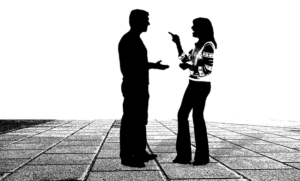
Arguing from anecdote is persuasive. One can use experiences to make a false correlation and persuade folks to abandon hard truth and follow fickle emotion, creating an appearance of kindness, humility, and Christian love. For example, it could be argued that we shouldn’t witness about Jesus and coming judgment because those topics are offensive and, after all, look at how few people repent and believe, so something is surely wrong with talking of such things. Using anecdotes, one could claim either directly or indirectly something like this statement:
“Less people are going to church. Of those who don’t go or quit going, most have had experiences of someone trying to witness to them and share the Gospel. They all claim to have been bothered by that interaction. I have spoken with so many people who agree with these statements and they are hurting. It didn’t work so we need to change our methods.”
Following the advice of someone swayed by experience, we can seem to be throwing off tradition for the sake of kindness and brotherly love; however, we are told that the message of the Gospel is powerful and is used by God to save souls (Rom 1:16). God saves by grace through faith (Eph 2:8) and faith comes by hearing the Word of Christ (Rom 10:17); not our good deeds, not our offers of friendship, not in meeting felt needs, but using the Word of God, folks come to believe (Rom 10:14-17). We are told by God in the Bible that few will find the Way of Life (Matt 7:13-14), yet we are commanded to go and make disciples (Matt 28:19) and that we will suffer persecution for seeking to live godly lives (2 Tim 3:12). Our good deeds and acts of charity should certainly adorn the Gospel. But those acts alone save no one. When we withhold the Gospel of Jesus Christ, we hold back the sinner’s only hope.
A Personal Experience
I have some experiences of my own to share along with my reaction to them. Let’s examine these things along with the light of Scripture. These experiences have to do with people trying to share the Gospel with me.

When I was unregenerate several people witnessed to me or made attempts. One lady stopped me at the post office because I had a bumper sticker on my automobile from the music group “Nine Inch Nails” and she was wondering what it meant. She had wondered if it were a reference to the nails used to crucify Jesus and she used that to inquire about my beliefs. I remember that she was clearly making a case for being a Christian. I told her that I was a Christian. When she inquired about church, I told her that we didn’t go to church because my husband was an atheist. (My husband at the time did claim to be an atheist). So, I asked her to pray for him.
Before that, a lady came to my house when I still lived with my parents. I was an older teenage at the time and I answered the door. She invited me to church and asked some questions about my beliefs. I named a church that a friend attended, making it seem like that’s where my family attended regularly.
I remember another occasion when a friend and I were eating at McDonald’s and a man with one hand curled up against his chest handed us Gospel tracts with his free hand. He didn’t speak. I remember he held his head off to the side. My friend and I smirked at each other and threw the tracts away unread with all the other litter on our trays as we left.
The other time I remember someone talking to me about Jesus happened at high school and college. A classmate in my high school English class invited me to church. I never did go with her. A year later, I ended up in an English class with her at the local community college. This time, she met me on campus and tried to share the Gospel with me. I was sitting outside smoking a cigarette and smiled to her and told her I was “saved” and that I’d been baptized (which I had as a kid, not knowing much what it all meant).
My Reaction Then and Now
For years after these events, whenever the topic of religion would come up, I’d often mention these encounters with the critique that “these people didn’t love me; they were just trying to fulfill some Sunday School quota.”
Now that I’m a Christian, when I look back on each of those interactions, I realize that my critical statement says something more about my own unregenerate heart than it does about those folks.
When I scrutinize those interactions, I now admit that there was nothing in their words or actions that was unkind or judgmental towards me. The lady at the post office had been pleasant and when I asked her to pray for my husband, she had assured me that she would. I had lied to her about the reason for us not going to church. The truth is that I had little interest in the things of God. She ended this conversation with a hope that she would see me again. I remember the lady who came to my door as being soft spoken and a little nervous. She was delighted to hear me mention going to church. I think of the man at McDonald’s and realize he probably couldn’t speak and while his arm was injured, he was doing what he could to share the Gospel with a couple of ungrateful, selfish teenagers.
I was a fool. I judged these people to be unkind even while suggesting that they were judging me! My only critique of them now is that some backed off when I made a claim of being a Christian. I wish they would have questioned me more, because I now know I was living in darkness and was self-deceived (1 John 1:6).
As someone who now witnesses of who Jesus is and what He has done, I look back on these experiences and people with kindness, realizing that witnessing is often done in fear and trembling, without ever seeing the fruit of your works. I now look forward to seeing these folks in Heaven. My judgment towards them changed as I was given a new, regenerate heart. It’s not that they were cold and uncaring—it was me that was unkind and uncharitable.
I now see these acts as God reaching out to a pitiful wretch like me, using folks willing to put themselves out there in uncomfortable situations to share His Good News.
Catering to the Unredeemed

What are we doing when we soften the truth based on emotional experiences? What are we doing when we set aside hard truth and replace it with pragmatism? We are going to allow the words of one who is spiritually blind (2 Cor 4:4) to override Biblical truth. Why jump to the conclusion that we need to change how we talk or how we conduct church services or evangelism based on the claims of someone whom the Bible says is deceived and spiritually blind!
If we change our behavior based on statements from unbelievers, we are following the lost, not helping them. The Bible says that such a one is blinded by the evil one (2 Cor 4:4) and if he claims that God doesn’t exist, then the Bible also says he’s a fool (Psalm 14:1, 53:1). God says that a fool resists instruction and thinks he’s wiser than everyone (Prov 12:15). Do we change our worship and our message based on the cries of fools? God forbid.
Kindness to the Unbeliever
When someone says that a Christian hurt him or was unkind, I am NOT claiming that we discard his statement or disregard his emotions. Please know I’m not advocating throwing out Bible verses without regard to someone’s pain. What I’m suggesting is that we weigh the whole story (Prov 18:17) and apply what the Bible speaks about the situation, either directly or by inference or principle.
When an unbeliever makes a criticism about Christianity, remember that you have someone before you whom the Bible says is spiritually blind; however, you also know the Bible warns over and over about false teachers and false professors. So, we know it’s entirely possible that someone claiming to know Jesus (but really doesn’t) said something unkind or untrue to the unbeliever. Why not point that out to the one claiming that he had an unpleasant interaction with a Christian? Why not use the situation as an opportunity to show the individual that the Bible speaks to the very issue of hypocrisy and warns of false professors? Remember, without the grace of God, you also would remain in spiritual darkness. Reprove with gentleness – God may yet grant that unbeliever repentance that leads to life (2 Tim 2:25).
We can be kind and humble in being willing to listen to critical claims about Christians, but we don’t want to end up appearing like we aren’t really sure what we believe or that we don’t believe we’ve found a truth and a hope for which we are willing to contend (Eph 4:14; Jude 3). Base your actions on the Word of God, not anecdotes and fickle emotion.
